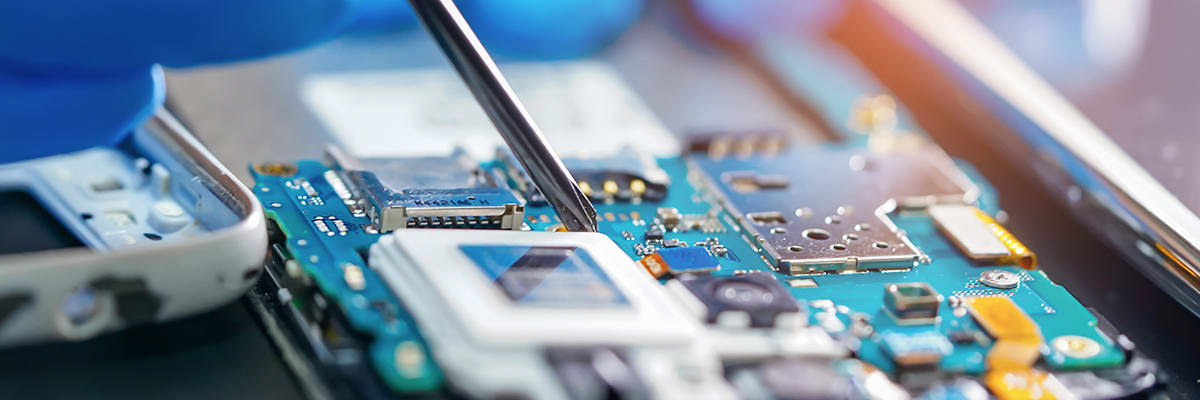
Return navigate_next
What a Chip Shortage Means for Upcoming Smartphones
April 23, 2021 *
Just when everyone thought the supply chain would get back on track amid ongoing COVID-19 pandemic issues, there is another snag. According to AndroidAuthority, there is a global processing chip shortage causing severe availability limitations of the most popular tech products that people need to work and communicate remotely. The matter has also created a domino effect in multiple markets, such as automotive, cryptocurrency, and smartphones.
If you're thinking about buying a new smartphone, it will help you make a better choice when you learn more about this shortage and how it might affect you and family members. Let's take a closer look to see what's going on.
Why Is There a Global Chip Shortage?
On April 15, 2021, TechNave reported that the global chip shortage is expected to continue into 2020, according to TSMC's CEO. Further, the shortage will almost certainly result in increased pricing for upcoming smartphones. There is stiff competition among other sectors besides smartphones including gaming consoles, laptops, and automobiles. Everyone is scrambling and trying to get what they can to serve their sector.
Smartphones managed to stay out of the fray for early phases of the shortage in 2020 and early 2021. Now, unfortunately, it seems more shortages are on the way without any sign of relenting. With a shortage, it's only natural that companies will charge more for an elusive, premium component of manufacturing. It's the law of supply and demand in action, and you might need to plan accordingly. Whether that means waiting to buy a new smartphone, paying a premium price, or exploring used smartphone and extended warranty options.

Unfortunately, TSMC CEO, C.C. Wei, recently stated that the demand remains high while the supply chain stays tight, and that translates to little-to-no relief for the coming year and into 2023. The problem doesn't lie solely with TSMC. Other companies, such as Intel and Nvidia have also reported their own issues with the global chip shortage, claiming they will also need time to recover and more speedily serve their clients and their customers.
But TSMC lies at the center of the issue, as its clients include some of the world's premier tech companies that rely on the firm to create their chipsets. Some of their clients include Nvidia, AMD, Apple, and Qualcomm. It's nearly inescapable for any smartphone owners to avoid this issue in the coming year-to-two-years since inventory might remain limited for products like computers, tablets, and smartphones.
Will the Global Chip Shortage Affect Your Smartphone Purchase?
While the effects aren't obvious to smartphone buyers now, they could become glaringly so in the next year. Right now, computer and gaming companies are taking the brunt of the blow against the tech industry, but your smartphone could be next. As a matter of fact, you might have already felt the effects when trying to buy a new laptop or desktop for work. The dire and unprecedented need for home-based technology throughout the Coronavirus pandemic has led to an extreme, rapid demand on technology firms that eventually caught up to everyone.
Technology manufacturers don't want to gouge customers, but they do need to make some difficult decisions during these times and circumstances. GadgetsNow recently shared a sentiment from Chinese smartphone maker Xiaomi Corp president Wang Xiang, saying "the global chip shortage was increasing the company's costs." He went on to state that the company would do its best to offer the best and most fair prices during a difficult situation.

What's Being Done to Solve the Chip Shortage?
Venture Beat reports that U.S. President Biden is seeking $37 billion in funding for legislation to supercharge chip manufacturing in the country, which could help greatly. There are already four new countries on tap for chip manufacturing, featuring two from the Intel Corp, one by TSMC in Arizona, and one in Texas by Samsung. Ideally, these new manufacturing spots will help ease the burden on the supply chain to deliver chips to tech companies to ramp up production.
Is Buying a Used or Refurbished Smartphone a Good Alternative Until Chips Are Readily Available?
One solution you might consider if you're in dire need of a reasonably priced smartphone is buying a used model that suits your needs. You might worry about the condition, but you'll be happy to find the latest flagship phones in excellent condition, certified by the refurbishing professional. Even better, to ease your mind, you can buy an Upsie smartphone subscription warranty to cover any issues that might come up, from a cracked screen to a battery failure and more. You can purchase an Upsie warranty for new, used, and old phones as long as the phone is in good working condition.
Learn More About Smartphones:
* This article is over 6 months old and may or may not be updated.
